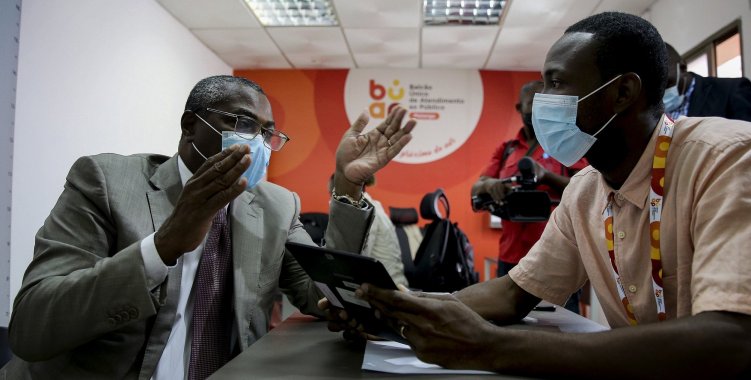The UNITA youth representative in Portugal, Edgar Capapelo, considered at a press conference that "the lack of adherence is an extremely big risk of increasing the margin for fraud", a concern shared by Bloco Democrático and PRA-JA Servir Angola, which part of the United Patriotic Front.
These opposition parties are demanding the extension of the period for official registration, which started on 17 January and runs until 1 March, the possibility for Angolan citizens living in Portugal to use documents other than the identity card to register, and the decentralization of posts for registration, limited to Lisbon and Porto.
They also criticize the fact that parties are not being given the opportunity to monitor the process: "When we do not participate, we do not understand it and we cannot tell people that it is safe", declared Edgar Capapelo, stating that it is up to opposition parties to publicize the registration through direct contact with Angolans in the diaspora, on social networks, and asking for the collaboration of artists and civil society organizations to spread the word.
It is the first time that Angolans abroad can vote for a general election, scheduled for August this year.
The representative of the Democratic Bloc, Manuel Santos, said that "not even the Olympic minimums are being done in publicity". "Fraud is built on exclusion. I'm excluded because I'm poor, because I don't have the resources to get to the place where I have to register", he argued.
To facilitate adherence to the official registration, the Patriotic Front parties suggested that Angolans in the diaspora could use their passports or consular cards, pointing out difficulties in obtaining identity cards, which only as of last year could be obtained without going to Angola, and even then with great delay.
They also suggested the possibility of mobile brigades that could reach the Angolan communities outside Lisbon and Porto, but the consular authorities claimed lack of financial resources, but none of these suggestions was accepted.
"It is worrying. I would venture to say that there is a clear intention to make the process unfeasible in the diaspora", stated Edgar Capapelo.
The representative of PRA-JA Servir Angola, Santana Lopes, stated that "the consular services have no interest in citizens being informed to exercise their right", stating that this is part of the MPLA government's strategy, which is committed to "acts gangsters, controlling the public purse" and perpetuating themselves in power.
"Fraud in Angola is institutionalized. The president of the National Election Commission is appointed by the President of the Republic. He belongs to the MPLA. Things start to not work there. Democratic institutions [in Angola] exist for the English to see. hostage. We live in a sphere of fear and nothing works", he lamented.
Edgar Capapelo said that UNITA volunteers have been in person at the door of consular posts and that there are days when no person registers, despite the consulate's figures showing 80,000 Angolans with electoral capacity living in Portugal.
Manuel Santos stated that "there are citizens with other party affiliations, including the MPLA, with an interest in the utmost honesty, because more than being militants, they are people who want a different future", defending that in view of the "omission and negligence" of the authorities, it is up to Angolans in the diaspora to transform themselves "all into electoral agents" and to spread the registration among their compatriots.
Opposition in Portugal blames diplomacy and consulates for failure to adhere to voter registration
Representatives of the Angolan opposition in Portugal blamed the consular and diplomatic authorities for the lack of adherence to the voter registration in the diaspora, considering that it is difficult, little publicized and that this opens the way to the possibility of fraud.







